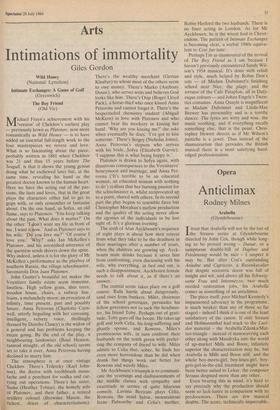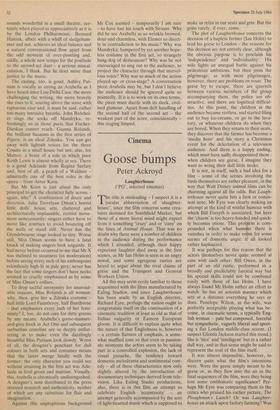Opera
Anticlimax
Rodney Milnes
Arabella ,
(Glyndebourne)
T trust that Arabella will not be the last of the Strauss series at Glyndebourne directed by John Cox, though while long- ing to be proved wrong – Danae, or a sumptuous double-bill of Daphne and Friedenstag would be nice – I suspect it may be. But after Cox's outstanding Ariadne and Capriccio, a Rosenkavalier that despite eccentric decor was full of insight and wit, and above all his Schweig- same Frau and Intermezzo, two much needed restoration jobs, his Arabella comes as something of an anticlimax.
The piece itself, pace Michael Kennedy's impassioned advocacy in the programme, is much weaker than any of those so far staged – indeed I think it is one of the least satisfactory of the canon. If only Strauss and Hofmannsthal had stuck to the Luci- dor material – the Arabella/Zdenka/Mat- teo triangle – instead of manoeuvring each other along with Mandryka into the world of up-market Mills and Boon; infinitely superior the characterisation may be, but Arabella is Mills and Boon still, and the whole boy-meets-girl, boy-loses-girl, boy- gets-girl-in-the-end treatment might have been better suited to Lehar, the composer Strauss despised more than any other.
Even bearing this in mind, it's hard to say precisely why the production should seem so lack-lustre in comparison with its predecessors. There are few musical doubts. The score, technically impeccable, sounds wonderful in a small theatre, cer- tainly when played as appreciatively as it is by the London Philharmonic. Bernard Haitink, albeit with a whiff of sledgeham- mer and nut, achieves an ideal balance and a natural conversational flow apart from the odd moment of over-pointing and, oddly, a whole new tempo for the postlude to the second-act duet — a serious miscal- culation, I think. But he does more than justice to the music.
The casting, too, is good. Ashley Put- nam is vocally as strong an Arabella as I have heard since Lisa Della Casa: the more challenging the writing, the more bravely she rises to it, soaring above the stave with rapturous ease and, it must be said, rather too many intrusive breaths. John Brochel- er sings the socks off Mandryka, re- freshingly so in those parts that Fischer- Dieskau cannot reach. Gianna Rolandi, the brilliant Susanna in the first series of Figaro, is an ideal Zdenka. You can get away with lightish voices for the three Counts in a small house but not, alas, for Matteo, a brute of a role in which poor Keith Lewis is almost wholly at sea. There is a good Adelaide from Regina Sarfaty and, best of all, a peach of a Waldner admittedly one of the best roles in the opera — from Artur Korn.
But Mr Korn is just about the only principal to get the character fully across again, why? A combination of decor and direction. Julia Trevelyan Oman's horrid little dolls' house sets, cluttered and architecturally implausible, restrict move- ment unnecessarily: singers either have to move like zombies to avoid bouncing off the walls or stand still. Never has the Glyndebourne stage looked so tiny. Worse still, Miss Oman seems to have a fatal knack of making singers look ungainly. It had never before occurred to me that Mr X was inclined to stoutness (in moderation) before seeing every inch of his embonpoint relentlessly high-lit in pale grey; never has the fact that some singers don't have necks seemed so cruelly emphasised as by some of Miss Oman's collars.
To drop tactful anonymity for unavoid- able reasons, Miss Rolandi is all woman; why, then, give her a Zdenka costume half little Lord Fauntleroy, half Bunthorne — that emphasises every inch of her femi- ninity? I, too, do not care for dirty greens by any means: Arabella's goose-manure- and-grey frock in Act One and subsequent surburban crinoline are so deeply unflat- tering as to make even the dazzlingly beautiful Miss Putnam look dowdy. Worst of all, the designer's penchant for dull colours in both sets and costumes means that the latter merge fatally with the former; the only character you could see without straining in the first act was Ade- laide in livid green and maroon. Visually, this Arabella is chronically undistingushed. A designer's note distributed to the press stressed research and authenticity, neither of which are any substitute for flair and imagination.
Against this unpropitious background
Mr Cox seemed — temporarily I am sure — to have lost his touch with Strauss. Why did he see Arabella as so wrinkle-browed, dour and charmless, with Elemer so direct- ly in contradiction to his music? Why was Mandryka, hampered by yet another hope- less costume in the first act, so strangely hang-dog of demeanour? Why was he not encouraged to sing out to the audience, to project the character through that marvel- lous voice? Why was so much of the action played up- or cross-stage? A conversation piece Arabella may be, but I don't believe the audience should be ignored quite so pointedly. If it is to work on its own terms, the piece must dazzle with its sleek, civil- ised glamour. Apart from deft handling of the second half of the second act — the weakest part of the score, coincidentally this staging limped.











































 Previous page
Previous page